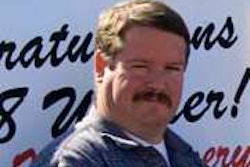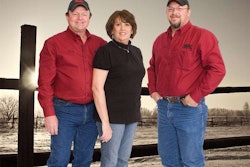Trimble Dimensions 2009
Trimble held its annual Dimensions conference February 23 to 25 at the Mirage in Las Vegas, and despite the downturn in the construction business, attendance at this survey and construction/earthmoving event was robust—perhaps even higher than last year.
Although there are well over a hundred surveying and construction workshops and sessions to attend during this three-day event, Trimble also lines up some top-notch speakers and visionaries to start each day. Trimble CEO Steven Berglund kicked off the event with a speech Monday morning to a ballroom crowd of about 2,300 people. Berglund emphasized that technology driven change is inevitable, the current economic conditions will only accelerate this change, and there will be winners and losers in this process.
“Corporate heroes are created in periods of adversity,” Berglund said, a time very much like the one we are going through now. By way of example he cited Andrew Carnegie, who bought and rebuilt industrial assets during economic downturns and was then able to leverage that strength when the economy rebounded. But the companies that succeed coming out of today’s economic downturn won’t do so by monopolizing prices like Carnegie, but by using technology to create a new type of organization.
The new type of organization Berglund would like to see his customers create is one in which information flows to whoever needs it automatically instead of getting bottled up in silos—the Trimble Connected Community, in a word.
Berglund was followed by motivational speaker and performance coach Dr. Bob Kriegel, author of the book Sacred cows make the best burgers, and a founder of the country’s first sports psychology institutes.
Kriegel opened with this question: Who succeeds in tough times? In sports as well as business, he says, it’s not the smartest or the strongest he says, but those who are willing to learn, to grow, to try new things. “The majority of people get into a bunker mentality. They’re playing not to lose,” he said. One thing about all great athletes, he said, is that they’re constantly rethinking the rules of the game and challenging their strategies.
Tiger Woods, after winning his first Masters Tournament, took nine months off to revamp his swing. In track and field, high jumpers had about reached their limits in 1968 when Dick Fosbury came along and went sailing over the highbar backwards—and more than a foot higher than anyone before him. The intriguing thing about Woods and Fosbury, Kriegel notes, is that they were already the best in the world at what they did. Instead of hunkering down, protecting their gains or playing not to lose, “They used their laurels as a springboard,” he said.
Another stumbling block to successful change happens when people try to work too hard, put the pedal to the metal, what Kriegel calls the 24/7 mentality. “What happens when you’re busy all the time is you don’t communicate well, you don’t listen well, you make mistakes. You have so many balls in the air you can’t focus and so you never come up with new ideas.”
When your left brain is racing all the time, your right brain — the creative side– never gets a chance, Kriegel said. As proof he asked how many in the audience get their best ideas at work. The reason most people get their best ideas in the shower or the bathroom is because that’s the only time in our overscheduled lives when we have an opportunity to turn our left brain off. Kriegel cited a Fortune magazine article that found many of today’s top leaders take at least a half hour every day and devote it to pure thinking time. If the office isn’t a place where you can get that kind of solitude, he recommends turning off the car radio to and from work and using that as your quiet time.
Kriegel also recommended corporations take time out for sacred cow hunts—a process of re-examining the old way of doing. He cited several examples: a tire company that saved $24 million a year not wrapping their tires before shipping (the wrapping was something they’d did during the white-wall days to protect the white areas from scuffing), and a deodorant company that saved $9 in packaging costs (the packaging process was left over from the days when the company shipped glass bottles—the new plastic bottles didn’t need the protection.)
“It doesn’t do any good to do things faster and cheaper, if they shouldn’t be done at all,” he said.









